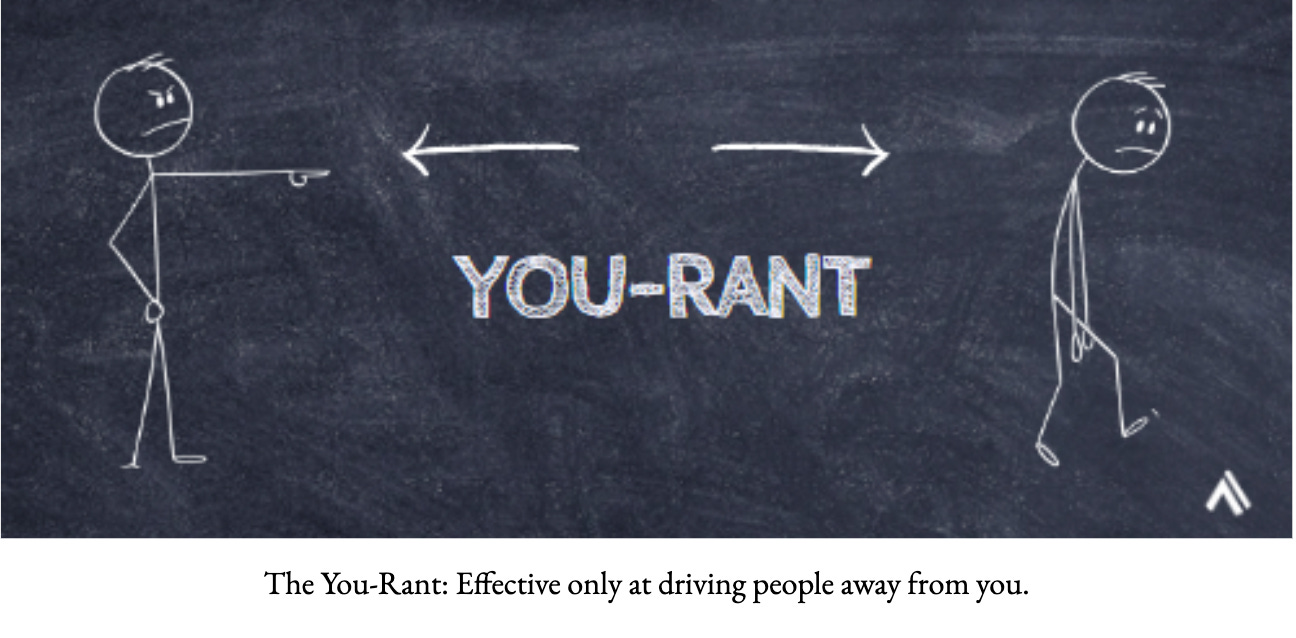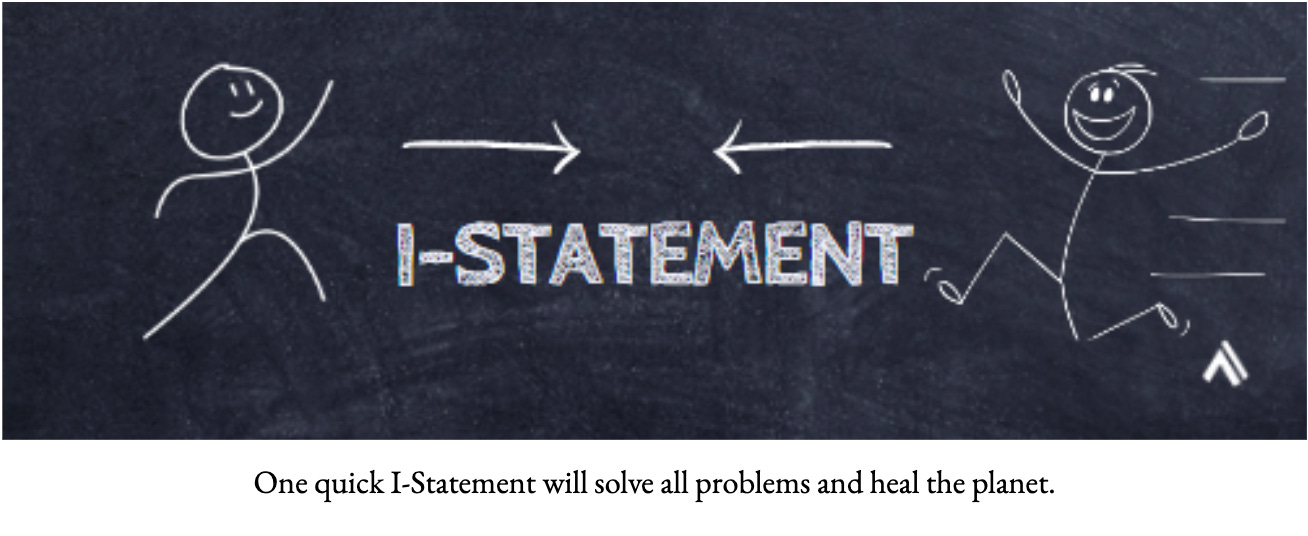Conflict happens all the time. The way we respond often makes things worse. There is a better path.
Talking Big Ideas.
“Conflict is inevitable – and the source of all growth.”
~ Jean Miller
Put yourself for a moment in Marty McFly’s shoes.
You’re in the classic scene from Back to the Future where you and your girlfriend are sneaking through the high school trying to get to class without being caught by the school principal, Mr. Strickland.
He finds you, and it’s obvious he’s angry. Principal Strickland says to you:
You got a real attitude problem, McFly, you’re a slacker! You remind me of your father when he went here, he was a slacker too. . . . I notice your band is on the roster for the dance auditions after school today. Why even bother McFly? You don’t have a chance, you’re too much like your old man. No McFly ever amounted to anything in the history of Hill Valley!
If someone actually said that to you in front of your partner, how would it make you feel?
This scene is a dramatic example of what psychologists call a “You-Message,” which is essentially short for “You are a problem!” It’s a common way people talk when they’re angry. I prefer to call it a “You-Rant” because the details of the message get buried under passion and anger.
We’ve all done it. Someone upsets us, and we often default to a You-Rant: we criticize and blame, raise our voices with an accusatory tone, and make exaggerated generalizations.
There are three common features of a You-Rant:
- Blaming Language: Places responsibility on the other person.
- “You ruined everything.”
- “It’s your fault we’re late.”
- “You got a real attitude problem, McFly, you’re a slacker!”
- Accusatory Tone: Sounds angry and attacking.
- “What were you thinking?”
- “What’s wrong with you?”
- “You remind me of your father when he went here, he was a slacker too.”
- Generalization: Exaggerates, often using always or never.
- “You always make us late.”
- “You never help.”
- “No McFly ever amounted to anything in the history of Hill Valley!”
You-Rants are bad communication.

They utterly fail in their mission to influence. Instead, they push the other person away from us by making them feel attacked, hurt, judged, threatened, and perhaps even shamed. You-Rants don’t put out the fire – they pour gasoline on it, which likely damages the relationship.
Avoid You-Rants at all costs – you’re better than Principal Strickland! And if he doesn’t resonate with you, consider Jack Nicholson in the iconic baseball bat scene from The Shining:
Any time you’re upset and want to speak your mind, think first about Principal Strickland or Jack Nicholson. Don’t be like them!
There is a better path.
***
My buddy Larry Salzman is one of the best communicators I know. He’s also a lifelong student of psychology, and when we get together, I enjoy picking his brain on how we can better understand and connect with ourselves and the people in our lives who matter most.
Larry is an expert in Leader Effectiveness Training (L.E.T.), a program that teaches executives how to transform their communication skills. He also heads the litigation team at Pacific Legal Foundation, where he has helped build one of the most impressive company cultures I’ve ever experienced.
L.E.T. was created by the psychologist Thomas Gordon, who writes in his book Leader Effectiveness Training:
You need to know how to help yourself. Why are some people so successful in getting their needs satisfied in their relationships with others? When someone’s behavior is causing you a serious problem, how can you influence that person to change without making her lose face or feel resentment toward you?
To succeed in relationships, we must be willing to speak our minds and let people know when they are causing us problems – and do it in a way that encourages them to change their behavior.

What’s the best way to do this?
How can we most effectively speak our minds and influence people to change their problematic behavior? Ideally, we want to share a message that has these qualities:
- APPEALING: Draws the other person towards us.
- CLEAR: Direct, simple, and understandable.
- HONEST: Truthfully explains the problem and how it causes us harm.
- EFFECTIVE: Influences the other person to change.
- RESTORATIVE: Helps to fix the problem and improve the relationship.
Gordon built a method that incorporates all of these. Done correctly it can work like magic to help solve problems and heal relationships.
It begins with an I-Statement.
Essentially the opposite of a You-Rant, an I-Statement avoids any message that could offend, condescend, threaten, or shame. No orders given or solutions suggested.
I-Statements have three simple components:
- Behavior: Clearly state the specific behavior that is causing you a problem. No blame, accusations, or exaggerations – just the facts.
- YES: When you get here late
- NO: When you’re always showing up late
- NO: When you don’t care enough to get here on time
- Effect: Describe as concretely as possible how the behavior is impacting you. Again, just the facts without exaggeration.
- YES: When you come in late, I have to stop working on the Flux Capacitor Project to fill out a TPS report
- NO: When you come in late, the organization is placed in peril
- NO: When you come in late, it shows the interns that nobody in management cares about the company’s values
- Feeling: Share in a genuine way how the situation affects you emotionally. This can be hard because it requires you to open up in an honest way.
- YES: When you come in late, I feel frustrated and stressed out about having to stop working on the Flux Capacitor Project to fill out a TPS report
- NO: I feel abandoned and hopeless. (The feelings you express must be true and not exaggerated.)
- NO: I feel that you enjoy letting our team down. (This is a disguised You-Message.)

The order doesn’t matter. Place the three components in whatever way works best for you. What is important is that you are assertive and honest without using any aspects of a You-Rant.
- Behavior: “When you interrupt me during conversations…”
- Effect: “…it makes it difficult for me to express my thoughts.”
- Feeling: “I feel unappreciated and ignored.”
***
- Behavior: “When you criticize my ideas in meetings…”
- Feeling: “…I feel undervalued and demotivated.”
- Effect: “It undermines my confidence in my contributions.”
***
- Feeling: “I feel scared and defensive…”
- Behavior: “…when you raise your voice during arguments.”
- Effect: “It escalates the tension and distance between us.”
A good I-Statement presents your perspective in a simple, direct way. It helps the listener understand you without attacking them. You also encourage them to respond constructively because you focus on your feelings and experiences rather than their faults.
Instead of pushing your own solution, you empower the other person to propose a solution on their own. When people feel they have agency, they are more willing to change.
You can be assertive and speak your mind while confronting people AND still draw them towards you to work together and solve problems.

My final graphic is exaggerated to drive home a point.
I-Statements are just the first crucial part of a problem-solving dialogue. To truly connect and make progress, you must pair your I-Statements with Deep Listening and effective conversation skills – which we’ll dive into in future pieces.




